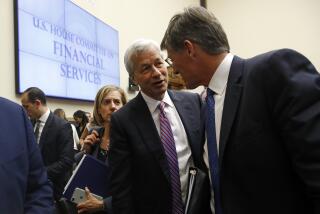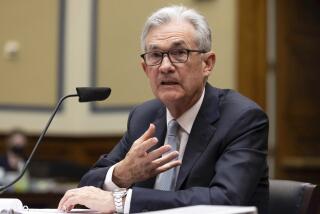Laffer Predicts Flat Tax to Come ‘Real Soon’
- Share via
Arthur B. Laffer adjusted his red tie and smiled broadly at the 1,100 people in the audience at the Sheraton Grande Hotel in downtown Los Angeles.
He was the last of 10 men dressed in dark suits with red or maroon ties to address the group, but he was--by Harold A. Ellis’ definition--”the only bona fide economist on the platform.”
Yet, these 10 brave men had more than apparel in common at the Grubb & Ellis-sponsored gathering. They were all there to talk about the future. Unlike the other nine who concentrated on commercial and industrial real estate in the Los Angeles basin, though, Laffer--who is an economic adviser to the Reagan Administration and a professor at Pepperdine University in Malibu--looked at the national economy, predicting:
“You’re going to see a flat tax in the future, and it’s coming real soon.”
On the other side of town, at the Los Angeles Hilton International Airport, Thomas R. Harter, senior staff vice president and chief economist of the Mortgage Bankers Assn. of America, spoke the same day to about 100 members of the California Mortgage Bankers Assn. about computerized loan origination and processing. However, after this talk, he took a few moments to answer some questions about the future of the national economy, especially as it relates to real estate, and he predicted that within the next 60 days, interest rates will rise.
“This will slow construction, and the existing home market will get hit right away,” he said, but he does not expect the real estate market to be hurt as badly as it was during the recent recession.
Even so, he said, “If somebody is planning to buy a house, I would recommend closing escrow within the next two months.”
This is a good time to buy a house, he said, “as home prices will rise more than they have during the past two years.”
However, he would not recommend buying a house as an investment. “Tax-free municipals are probably the best investment for people in high tax brackets, because the growth and appreciation of real estate isn’t there anymore,” he said. “If you’re an institutional investor, though, commercial real estate would be a good investment.”
Harter even looked ahead as far as the year 2010, when he sees “a rapid appreciation in home prices” resulting from what he calls “the second baby boom, which started two years ago.” The year 2010 is “when these babies hit the housing market,” he explained.
Then, he said, “school sites that may go 10 years with no kids may have a boom, because basic values will not have changed. People will still want to live in the suburbs.”
Harter called the federal deficit the current “No. 1 national problem.” And he agreed with Laffer, saying, “We can’t raise taxes to solve it, so we must do it by cutting spending.”
This will result, he said, in capping Social Security payments and cutting defense spending.
At the same time, the country will undergo another recession that will start at the end of this year, he predicted.
“But it won’t be a recession to the extent that it was in ‘81,” he emphasized.
More to Read
Inside the business of entertainment
The Wide Shot brings you news, analysis and insights on everything from streaming wars to production — and what it all means for the future.
You may occasionally receive promotional content from the Los Angeles Times.










